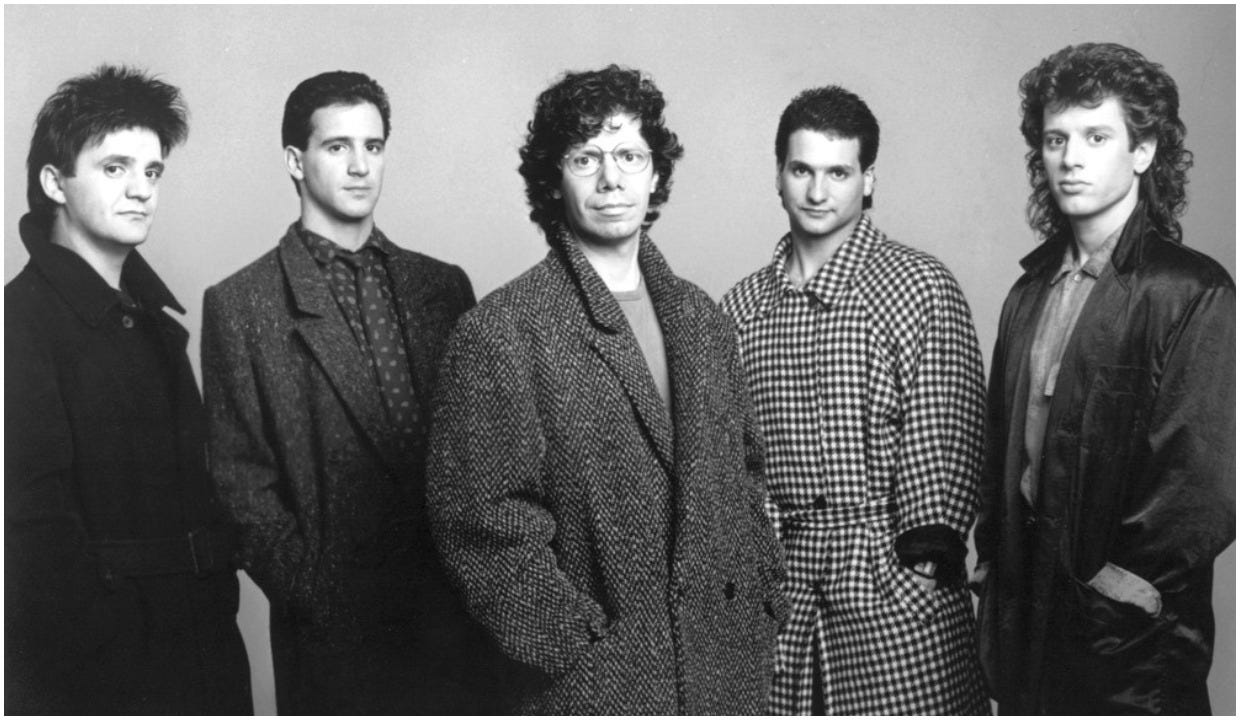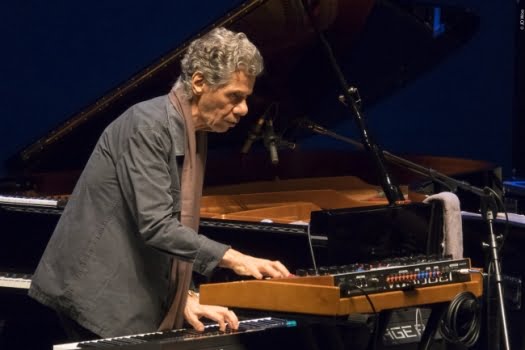First things first: I hate almost all of Lou Reed’s music. The Velvet Underground, his solo stuff, the album where he dragged Metallica down with him — all of it. But I love Metal Machine Music. It’s beautiful; it sounds like birdsong to me. So this piece, featuring him talking to British music journalist Allan Jones about that album circa 1977, was somewhat entertaining. Maybe you’ll like it, too!
Also: This Foreign Affairs review of three new books by right-wing “philosophers” who want to tear down America and erect some kind of Catholic fascist state in its place is fascinating, mostly because I can’t figure out what role any of these men think they would have in the kind of country they dream of. I mean, it’s like a college professor proselytizing for the Khmer Rouge. But you need to watch out for these people, because they are very serious about their fundamentally unserious ideas.
And speaking of seriousness…

I interviewed Chick Corea once, in 2009, when he was on tour with the Five Peace Band, a short-lived quintet that featured John McLaughlin on guitar, Kenny Garrett on alto sax, Christian McBride on bass, and Vinnie Colaiuta (and later Brian Blade) on drums. He was a very nice guy, with an interesting perspective on his own work.
“More and more over the past five years, 10 years, going into a studio to quote-unquote make a record has been less and less a part of my musical life,” he told me. “There’s less and less remuneration in it, and I find that the live recordings are actually reflect what kind of a spirit of music I like to give to an audience even more. So I haven’t been moved to go into the studio to record for a good while.” Again, this was in 2009.
He also said, “My best monitor of what’s going on in the culture concerning music and art is when I perform in front of an audience and I see how they respond to various things that I present to them. ’Cause I present them with a lot of different kinds of things. The other group of opinions is the press — media, magazines and awards shows and that kind of thing. And although I’m a member of that community too, I pay less attention to it.”
He seems to have been genuinely incapable of telling the difference between a good idea and a bad one. He approached music with florid passion, and he loved to play around with technology, more so than any jazz keyboard player other than Herbie Hancock. Sometimes this yielded thrilling results, as when he was scorching the air in Miles Davis’s 1969-70 bands. The nightly battles between Corea and Keith Jarrett at the Fillmore East in New York, documented on Miles Davis At Fillmore and much more fully on the third volume of the Bootleg Series, are incredible.
But then there’s the Chick Corea Elektric Band. This group, which made five albums between 1986 and 1991, started out with saxophonist Eric Marienthal, bassist John Patitucci, drummer Dave Weckl, and two guitarists — Scott Henderson and Carlos Rios. After the self-titled debut disc, though, Frank Gambale became the sole guitarist, and stayed for the next four albums: 1987’s Light Years, 1988’s Eye of the Beholder, 1990’s Inside Out, and 1991’s Beneath the Mask. And this music, which I’ve been listening to for the first time over the past week because the albums have been remastered and reissued — they’re coming out as a 10LP box set (and as individual CDs) on December 1, but are on streaming services now — is just mind-boggling. And I don’t entirely mean that in a good way.
I have a friend, Alfred Soto, who haaaaates to see the descriptor “dated” applied to music. His argument, and he’s right, boils down to: why are Linn drums and Fairlight stabs perceived to mark the songs that feature them as inextricably of their time, when the instrumental tones associated with “classic rock” are not similarly freighted with negative associations? Why is it OK to sound like Led Zeppelin IV, but not Debarge’s “Rhythm of the Night”? The simple answer, of course, is bias — (mostly) white rock being seen by those who shape(d) The Discourse, when it was still up for grabs, as inherently more legitimate (yeah, yeah, stop laughing) than black and Latin pop. And even if I recognize that it’s the result of cultural programming, I can’t deny that my taste leans more toward the analog than the digital, and that certain programmed rhythms, keyboard sounds, and melodic choices will always strike me as both “of the ’80s” and somehow disposable/plastic/kitsch.
The more complicated answer to the question of why certain sounds are “dated” and others aren’t is technological. Analog audio recording, as an art and a craft, reached its peak in the mid to late ’70s. Things were already starting to go awry here and there (Example No. 1: the rubber-band bass sound heard on acoustic jazz albums from about 1973 to the early ’90s), but in general, albums recorded in the 1970s sound fucking incredible, and I’m not just talking about Steely Dan. Even the most replacement-level rock acts — your Foreigners, your Bad Companys, your also-rans I won’t even bother naming — could dial in guitar and drum sounds that were like being wrapped in a warm blanket of sound.
But when digital technology came along, engineers more or less had to start over. The new equipment didn’t capture sound the same way — it just couldn’t. Processing power wasn’t up to the task. And synthesizers and drum machines had a gloss and gleam that was great for certain things, but they had none of the subtlety of what had come before. Truly creative spirits were able to make the new machines do amazing things, but there was a whole lot of awkwardness, too, of engineers trying to keep applying methodologies that they didn’t realize were obsolete, and musicians trying every new toy that came along without figuring out ways around their limitations. This is why early hair metal records sound like raw ass. It’s why the whole subgenre of “AOR bands grappling with New Wave” sucks so hard. The only albums from this era that work are the ones where the artists pushed all the way through and emerged on the other side with something genuinely new: ZZ Top’s Eliminator, Yes’s 90125. In the realm of jazz, it’s why a lot of albums on the Telarc label have an uncanny valley sheen that’s completely off-putting to me.
What does all this have to do with the Chick Corea Elektric Band, you ask? Well, I submit that there is no music on Earth more late ’80s than this music. This stuff makes the Miles Davis albums cloth-eared dimwits still scorn (Decoy, You’re Under Arrest, Tutu, Amandla) sound like the Bad Brains. It sounds like theme tunes from forgotten sitcoms. When I listen to a track like “Your Eyes,” from 1987’s Light Years, I keep waiting for Deniece Williams to start singing. The synth tones Corea embraced, particularly on the first two albums, were some of the most stock available. They were pretty much presets. The other instruments — particularly Frank Gambale’s guitar, which sounds like the “hard rock” solos that interrupted Whitney Houston songs, and Dave Weckl’s drums, which sound like someone whacking a leather couch with a ping-pong paddle — are so garish you may actually find yourself laughing. Can these guys play? Absolutely. They’re virtuosi, to a man. But when they’re working out on funk themes as simple as the ones heard here, and giving pieces titles like “Jammin E. Cricket,” you may start to wonder what the point of it all is.
If you like ’80s Miles, if you like Prince’s “jazz” pieces, but most of all if you like the music of Mike Post, you may very well like the Chick Corea Elektric Band. Some of it is OK (“A Wave Goodbye,” from Beneath the Mask, rides a surprisingly deep digital dub groove). A lot of the rest, though, reminds me of listening to CD 101.9 for eight hours at a time while working at Quick Chek. If and when you listen to these albums, I can pretty much guarantee that you will think, at some point if not repeatedly, Oh yeah, this music was absolutely made between 1986 and 1991.







More Stories
CD review: George Benson – Dreams Do Come True: When George Benson Meets Robert Farnon – 2024: Video, CD cover
The band was tight as ever. The Warren Haynes Band cuts loose: Video, Photos
Interview with Alvin Queen: Feeling Good – I heard these tunes played by … Video, new CD cover, Photos